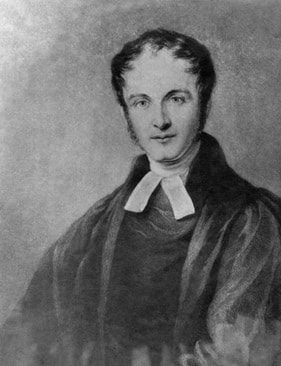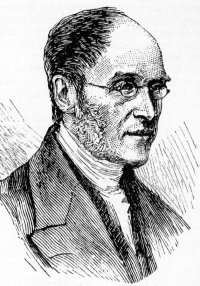|
Henry Francis Lyte was an Anglican preacher, hymnodist and poet whose best hymns include Abide With Me, and Praise, My Soul, the King of Heaven. Born on 1st June 1793, Lyte was the second son of Thomas and Anna Marie Lyte of Ednam, Scotland. His father arranged for Lyte and his older brother to attend Portora Royal School in Ulster, Ireland, but then deserted the family. Shortly after this, Lyte’s mother died, however, recognising his ability, the headteacher of the school agreed to pay Lyte’s fees and "welcomed him into his own family during the holidays." Lyte went on to study at Trinity College, Dublin, after which he took Anglican holy orders in 1815. His first curacy was in County Wexham, however, Lyte was not sure whether he was in the right vocation. Yet, the following year, Lyte experienced an evangelical conversion and began studying the Bible in earnest. By 1817, Lyte had become a curate in Cornwall where he met and married Anne Maxwell. Seven years older than her husband, Anne was a keen Methodist and the marriage worked well. They had five children, the youngest being Farnham Maxwell-Lyte, a pioneer of photography. Lyte’s daughter Emily Jeanette bore Lyte a grandson who went on to be known as Sir Henry Churchill Maxwell Lyte, the Deputy Keeper of the Public Records. From 1820 to 1822, Lyte lived and worked in Hampshire before relocating to Devon. In 1824, the family settled in Lower Brixham where he established the first Sunday school in the Torbay area, plus a Sailors’ Sunday school. The latter provided general schooling for uneducated sailors. Lyte became so popular in Lower Brixham, the church had to be enlarged. Admittedly, some people were attracted to Lyte for his good looks and personal charm, although he was slightly eccentric. He was an expert flautist who could often be found with his flute nearby. He could speak Latin, Greek and French; enjoyed literature; and had considerable knowledge of wildflowers. Yet, he still had time for his parish, predominately consisting of fishermen, and supplied every ship with a Bible. He also compiled religious songs and devotions for the men to use whilst at sea. Lyte even found time to dabble in politics, in which he took a Conservative stance, assisting Samuel Wilberforce in his request to abolish slavery in Great Britain. Lyte published a few books, mostly of poems, but also a small collection of psalms and hymns entitled The Spirit of the Psalms. With lyrics based on the Psalms, Lyte’s most famous hymn is Abide with me! Fast falls the eventide. This was written after Lyte had preached his final sermon before travelling to the continent for health reasons, from which he never returned. Based on Luke 24:29 (But they constrained him, saying, Abide with us: for it is toward evening, and the day is far spent. And he went in to tarry with them.), it became a favourite of George V and George VI. It is also the hymn the nurse Edith Cavell sang whilst she faced a German firing squad and her death. Abide With Me has been sung at every FA Cup Final since the 1927 game between Arsenal and Cardiff City. The first and last verses are traditionally sung about 15 minutes before kick-off. Rugby League followed suit, singing the hymn at every Challenge Cup Final since 1929, the first time the match took place at Wembley Stadium. Along with Abide With Me, Lyte’s top four hymns are Praise, my soul, the King of Heaven; Jesus, I my cross have taken; and Pleasant are Thy courts above. Praise, my soul is based on Psalm 103 and was sung at the wedding of Princess Elizabeth (now Queen) and Prince Philip, Duke of Edinburgh. It was also the first hymn sung at the funeral of former US President George H. W. Bush. Sadly, Lyte began experiencing health problems from a young age, writing the poem Declining Days when he was only 46. Before then, Lyte had been diagnosed with debilitating asthma and bronchitis, for which he sought treatment in continental Europe. As a result, his congregation began to diminish, preferring a vicar who was fit and well over one who could not guarantee he would be well enough to preach. By 1840, Lyte was spending most of his time in the south of France and Italy where the climate was better for his lungs. This meant he was unable to conduct his daughter’s wedding ceremony. Nevertheless, Lyte always appeared cheerful and interested in current affairs. He returned to England for the summer of 1847, where he preached for the final time before heading back to Italy. In November, he passed away in Nice. His final words were recorded as “Peace! Joy!” "Praise, my soul, the King of Heaven; To his feet thy tribute bring. Ransomed, healed, restored, forgiven, Who like me his praise should sing?"
~ Henry Francis Lyte
0 Comments
Your comment will be posted after it is approved.
Leave a Reply. |
©Copyright
We are happy for you to use any material found here, however, please acknowledge the source: www.gantshillurc.co.uk AuthorRev'd Martin Wheadon Archives
June 2024
Categories
All
|


 RSS Feed
RSS Feed